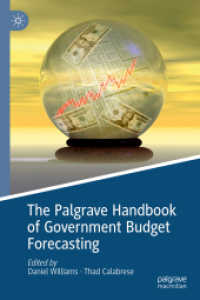Full Description
The field of conflict resolution has evolved dramatically during the relatively short duration of the discipline's existence. Each generation of scholars has struggled with the major puzzles of their era, providing theories and solutions that meet the needs of the time, only to be pushed forward by new insights and, at times, totally upended by a changing world.
This introductory course text explores the genealogy of the field of conflict resolution by examining three different epochs of the field, each one tied to the historical context and events of the day. In each of these epochs, scholars and practitioners worked to understand and address the conflicts that the world was facing, at that time.
This book provides a framework that students will carry with them far into their careers, enriching their contributions and strengthening their voices. Rather than a didactic approach to the field, students will develop their critical analytical skills through an inductive inquiry. Students will broaden their vocabulary, grapple with argumentation, and develop critical reading skills.
Contents
Preface
Introduction
About the Authors
Part I: Epoch One: 1945 - The Fall of the Berlin Wall
Epoch One - Topics
Aggression: Barash and Webel- The Individual Level
Human Needs: Burton - Needs Theory
Greed and Grievance: Collier - Economic Causes of Civil Conflict
Structural Violence: Galtung - Violence, Peace, and Peace Research
Epoch One - Tactics and Strategies
Negotiation: Wertheim - Negotiations and Resolving Conflict
Game Theory: Brams - Theory of Moves
Alternative Dispute Resolution: (ADR): Sander- Alternative Methods of Dispute Resolution
Epoch One- Research Methodologies
Global Peace Index and Global Terrorism Index
Failed States: Etsy and Goldstone - The State Failure Project
Negotiation Outcomes: Irmer and Druckman - Explaining Negotiation Outcomes
Epoch One: Questions for Discussion
Part II: Epoch Two: Coexistence as Peace 1991-2000
Epoch Two: Topics
Coexistence: Chayes - Imagine Coexistence
Identity: Kriesberg- Identity Issues
Culture: Avruch- Frames for Culture and Conflict Resolution
Religion: Gopin - Religion as an Aid and a Hindrance
Gender: Cheldelin and Eliatamby—Challenging the Dominant Narrative
Intractable Conflict and Trauma
Intractable Conflicts: Burgess -What Are Intractable Conflicts?
Moral Conflict - Pearce and Littlejohn - The Problems of Moral Conflict
Chosen Trauma: Volkan - Large-group Psychodynamics and Massive Violence
Epoch Two: Approaches
Emotion: Fisher and Shapiro - Emotions are Powerful, Present and Hard to Handle
Problem Solving Workshops Kelman- Interactive Problem Solving as a Tool for Second Track Diplomacy
Mediation: Curle -Mediation
World Café: Brown - The World Café: Shaping Our Futures Through Conversations That Matter
Appreciative Inquiry: McClellan- Marrying Positive Psychology to Mediation
Systems Thinking: Vallacher- Rethinking Intractable Conflict
Peacebuilding:
Everett: Intergroup Contact Theory
Lederach, John Paul -An Integrated Model for Peacebuilding
Non-violence: Sharp - Facing Acute Conflict
Truth and Reconciliation: Rotberg and Thompson: Truth v. Justice: The Morality of Truth Commissions
Epoch Two: Research Methodologies
Grounded Theory: Akinyoake --Developing Grounded Theory in Peace and Conflict Research
Case Study: Federman: Genocide Studies and Corporate Social Responsibility: The Contemporary Case of the French National Railways (SNCF)
Ethnography:
Hoey- A Simple Introduction to the Practice of Ethnography
Nordstrom: Shadows of War
Epoch Two: Questions for Discussion
Part III: Epoch Three - Transboundary Conflicts- 2001-Present
Epoch Three: Topics
Power, Marginalization, and the Politics of Voice
Power: Jabri - Discourses on Violence
Narrative Theory: Cobb - Speaking of Violence
Beyond Coexistence: Payne - Contentious Coexistence
Politics of Victimhood: Enns -When Victims Become Killers
Feminist Theory: Enloe - Bananas, Beaches, and Bases
Silence: Dwyer - A Politics of Silences
Narrative Repair: Nelson - Reclaiming Moral Agency
Epoch Three: Praxis
Critical Theory: Hansen: Critical Conflict Resolution Theory and Practice
Narrative Mediation: Winslade: Narrative Mediation: What is it?
Radical Care: Ginwright: Fostering Caring Relationships for Social Justice
Social Media: Castells: Dignity, Violence and Geopolitics: The Arab Uprisings
Upending Normative Processes: Gardner: The Dork Police
Epoch Three: Research Methodologies
Participatory Action Research (PAR): Fine and Torre - Re-membering Exclusions: PAR in Public Institutions
Decolonizing Research: Fontan - The Case for Decolonizing Peace
Epoch Three: Questions for Discussion
Bibliography
Index








